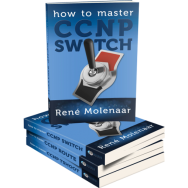Every now and then people ask me what the best way is to study networking. Since there is so much information to absorb I believe a good “study method” will help you achieve the best result. Here are some tips I advise people who are new to networking to do:
- Work your way from the bottom to the top. The OSI-model isn’t just a pretty picture from CCNA but it makes sense to start with the “layer 2” protocols (Ethernet, Frame-Relay, Serial links) and then move on to “Layer 3” stuff like IP and routing. When you start learning routing protocols begin with RIP/EIGRP/OSPF before you even think about looking at more advanced stuff like BGP or MPLS.
- If you don’t understand something 100% then continue until you FULLY understand it. Don’t skip it with the feeling “nah i’ll get back to it later”. Use different show commands, debugs to see what is going on or use the forum to ask questions. If you don’t fully understand something and continue it’ll stab you in the back in the future (trust me…I know that from experience 😉
- Try to spend your time at one or two topics. Not three or four. If you spend your time at one protocol it’ll be very effective but it might be a little boring. Try to pick two protocols that have some familiarity. Working on OSPF and EIGRP is a good idea or Frame-Relay and Ethernet. Don’t study something like BGP and Frame-Relay at the same time. It’s possible but it’s better to have your thoughts in the same “area” instead of spreading it around completely different topics.
- Create mindmaps…no notes! Download freemind. This is a free tool for mindmapping. Notes are just a bunch of lines of a piece of paper. I really like mindmaps because they show you the relationship between items. If you never heard about mindmapping, download freemind and give it a shot.
- Repetition is the key to remembering. If you read something once it will be in your short-term memory and it will soon be transfered to null0. If you repeat information spread over a couple of days it will be stored in your long-term grey flash memory.
- study/read when you are fresh (best in the morning). Lab when you are tired or don’t feel like studying. Reading takes more effort than doing practical stuff.
- Prepare your study environment. Try to make sure you get all your time-wasting activities out of the way. It’s really easy to switch from that 1000-page book or 100 page RFC document to Facebook when you are sitting behind the PC. Unplug your Internet if you have to, read that book in the library to get things done. Make sure your routers/switches are easily accessible so you don’t have to spend 15 minutes to get your “labs” going.
I hope this is helpful to you. If you feel anything is missing please let me know!

Do you want your CCNA or CCNP Certificate?
The How to Master series helps you to understand complex topics like spanning-tree, VLANs, trunks, OSPF, EIGRP, BGP and more.
Written by René Molenaar - CCIE #41726


HI Rene .. Sir how are you ?
well sir i wanted to know about the videos in the labs tha are those videos for CCNA ? or CCNP ?
It’s everything……CCNA, CCNP and even CCIE.
Good advice…
Thanks
i am planning to go for CCIE Data Center, i am not good at CCNP
{R&S} should i go for it?
No. You need to fully understand switching, especially the fundamentals of port-channeling, before you tackle anything CCIE level.